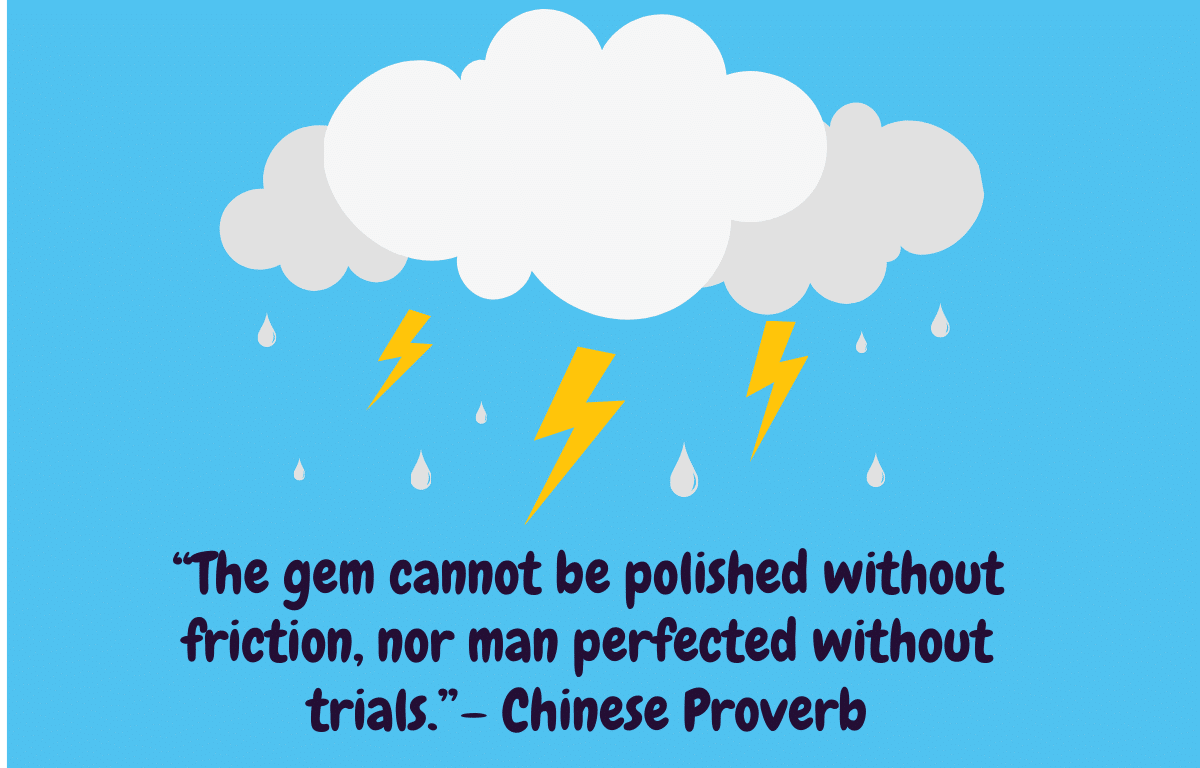When faced with difficulties as human beings, our natural reaction is to avoid the situation rather than power through it. Years of evolution have wired our brains to seek the comfort of the familiar and avoid the discomfort that comes with new and challenging experiences.
When you experience fear, whether physical or psychological, the part of the brain responsible for dealing with emotions (limbic system) is triggered before the reasoning part of the brain (neocortex). Overwhelming fear triggers a fight or flight response that makes you act before you think.
Subconscious reactions are necessary for your survival. But they can also be an impediment when there’s no actual danger or when the situation calls for an appropriate response rather than a spontaneous reaction.
Emotions can teach you a lot about yourself, but you should never allow them to take control of your responses. Hasty responses such as outbursts of anger make it difficult to have meaningful relationships, handle conflicts, and communicate effectively.
Although avoiding struggle is a natural biological response, it is also ironic because struggle can teach us many valuable lessons. Struggle builds character, makes you stronger, and enables you to grow in all aspects of your life. Nobody wakes up in the morning hoping to struggle, but the struggle can provide you with valuable life lessons.

5 Lessons Struggle Teaches You That Are Valuable In Life
Every cloud has a silver lining. Going through a difficult phase in life can be immensely valuable if you face it with an attitude of perseverance and patience. The following are 5 valuable lessons struggle teaches you.
1. Resourcefulness
Resourcefulness is the ability to look for and utilize available resources to attain a certain objective. Achieving your set goals may seem impossible when resources are limited, but this is also an opportunity to be resourceful and make the best of what you have.
Persevering in times of struggle enables you to think outside the box and try new approaches to dealing with the problem. Rising above the struggle of limited opportunities will teach you to be more resourceful and enhance your problem-solving skills for the future.
“Success is not about your resources. It’s about how resourceful you are with what you have.” – Tony Robbins
When you grow up in a family with little money, the only choice you have is to find creative solutions to make ends meet. For example, when I was growing up I remember how my mother used any spare paper for taking notes and math practice, any spare cloth for making clothes, or to utilize a pencil till it disappears by attaching it to pen handles.

Being resourceful will not only help you achieve your goals but will also help you manage stressful situations better. According to a research conducted to examine the impact of learned resourcefulness on the relationship between academic stress and academic performance, highly resourceful students were found to be better at managing academic stress.
The study which sampled 141 university students revealed that academic stress negatively impacted the students’ academic grades. However, the stress had no impact on students who showed high resourcefulness.
The frustration you experience when struggling with a problem can open up your mind to alternative ideas and solutions. When the methods you’re using are not helping you find a solution, you are bound to try other ideas you wouldn’t have thought of had things been sailing smoothly.
You may even try things you had initially ignored. Struggle can bring out the hidden creative genius within you, enabling you to see a problem from a new angle. You tend to remain in your comfort zone and take less risk when everything is going well.
The best way to learn resourcefulness is to look beyond your struggle and approach problems from a new perspective. By not giving up when problems seem difficult, you can learn from mistakes along the way. This is the common formula that highly successful people like Walt Disney, Richard Branson, etc have utilized in their respective careers.
2. Struggle Teaches You Prioritization and Helps You Realize What Is Really Important
Prioritization means choosing what matters most. When you face multiple tasks and responsibilities in life, they will compete for both your time and resources. Although everything may seem important, not every task requires your urgent attention.
Learning to prioritize will save time you would have wasted going back and forth between tasks. Prioritizing is a skill that needs constant practice. It requires you to know what matters and recognizing what should be put on the back burner. Facing struggles in life will teach you to let go of things that don’t add value and to value what is really important.
When your financial situation is favorable, you will find joy engaging in activities such as going to the club, shopping, traveling, dining in restaurants, and going to events. When you’re facing struggle, however, you may not see these activities as high priority ones. You will more likely direct your resources (time, attention, money) to more important activities.
Instead of eating out, you will start cooking. Instead of going to the club, you will consider a more intimate gathering of friends in your house. Rather than buying things you don’t need, you will learn to appreciate what you have in life. Little by little, you will realize you don’t really need fancy stuff to be happy and learn to appreciate the simple things.
When you’re dealing with adversity, how you adapt or cope will determine whether you bounce back quickly or not. Self-awareness is crucial to developing emotional intelligence. Learning to monitor your thoughts and emotions will help you understand yourself better and be at peace with who you are.
When dealing with life struggles, the important thing is to make taking care of yourself physically and emotionally, your first priority. Physical self-care includes getting enough sleep, eating healthy, and engaging in physical activities. Emotional self-care tips include self-acceptance and learning to appreciate yourself and your needs. Put on your oxygen mask first.

3. Struggle Makes You More Confident and Humble in Your Ability to Weather the Storms
The story of the struggling butterfly paints a perfect picture of how struggles are an integral part of life. It shows how difficulties along the way help strengthen your resolve and brace you for bigger storms ahead.
A gardener saw a butterfly laying some eggs and took an interest in a particular egg. He began to notice the egg moving and shaking a little. Here was an opportunity to see life brought forth before his eyes, and he watched for hours as the egg began to expand. Cracks started to develop, and he could see the head and antennae as the pupa struggled to come out of the egg.
As he saw the struggling little creature, he took mercy on it and decided to help it by breaking the egg with his forceps. Long story short, the pupa did make it out of the egg, but it never grew to become a fully-fledged butterfly. Denying it, the struggle of breaking out of the egg on its own made it weak, and it died after four weeks.
Just like the young pupa, your life struggles are only building your confidence and preparing you for tougher challenges ahead. If you take the easy way out, you will enjoy instant gratification but limit your own growth. Embracing your circumstances will make you stronger and help you appreciate life more. As you face struggles, you will learn your strengths and weaknesses. You will also learn to accept things you can’t control.
Oliver Wendell Holmes once said, “A mind that is stretched by a new experience can never go back to its old dimensions,” and he was right.
Going through challenges in life requires both physical and mental strength. Although you can’t control what happens to you, you can change your attitude and choose your response. Changing how you look at things will enable you to master change instead of allowing it to master you. Mastering change will make you more confident and less afraid of what life throws your way.
Henry Ford once said, “Whether you think you can or think you can’t—you’re right”. A study published in a journal of the Association for Psychological Science supports this statement. According to the study, people who believe they could learn from their mistakes fare better than others after making mistakes. Your attitude determines your level of success.
“The harder the conflict, the more glorious the triumph. What we obtain too cheap, we esteem too lightly; it is dearness only that gives everything its value. I love the man that can smile in trouble, that can gather strength from distress and grow.”
― Thomas Paine
4. Struggle, if You Never Forget It, Can Help You Stay Grounded
Change and uncertainty can make you feel like things are spinning out of control. When things are bad, keeping a calm head is a challenge as your mind is constantly racing. If you lack experience in dealing with difficult situations, you can easily get lost in the maze. The current Coronavirus pandemic is a perfect example of how change and uncertainty can lead to fear and panic. It has taught us that everyone reacts differently in challenging situations.
While the pandemic is a challenge, it is also an opportunity. If you’re able to stay grounded, you will emerge out of the crisis stronger and able to overcome similar challenges in the future. The coronavirus crisis has not made the world unpredictable. It has only revealed how uncertain and unpredictable life is.
Challenges and change are inevitable. The best you can do is embrace them and allow them to become your teacher. Tackling challenging situations will keep you grounded as you recognize that there’s always room for improvement and more to learn.
The story of Abraham Lincoln can teach us many life lessons. But most of all, it teaches us the importance of being humble. Lincoln is arguably one of the most iconic presidents of the United States and is revered for his modesty and deep-seated humility. He was a leader who was willing to admit his shortcomings, accept his mistakes, and learn from them.
Lincoln’s road to the white house was riddled with failures and disappointments. As a child, his family was forced to move out of their home because of land disputes, and his mother died shortly after when he was merely nine years old. He tried his hand at business and failed multiple times and experienced financial struggles that drove him to the verge of mental dissipation.
Yet despite all his failures, he still managed to stand on his feet, dust himself up and take charge of his destiny. He sought to improve his life through constant learning and self-reflection. When the going gets tough, being fully present will help keep you grounded. Take control of your emotions and focus your mind and energy on things you can control.

5. Struggle Imbibes in You a Respecting and Helpful Attitude Towards Our Fellow Beings
Experiencing adversity in life can make you more respectful and helpful towards others. If you have experienced pain, it is easier to understand another person’s pain. According to Dr. Sood, adversity breeds compassion. Several studies have revealed that experiencing hardships is a catalyst for developing empathy for others. These studies show that people with low socioeconomic status develop feelings of compassion when responding to the suffering of others.
They are also able to determine the emotional state of others with better accuracy. Such individuals also exhibited more prosocial behavior and have more motivation to connect with others compared to their counterparts with higher socioeconomic status.
“The struggle of life is one of our greatest blessings. It makes us patient, sensitive, and Godlike…” – Helen Keller
Battling life struggles gives you valuable experience. You can understand situations and people better as you compare their battles with your own experiences. When you meet people in a similar predicament, you are in a better position to help since you have walked the same path before. You will also feel closer to people with whom you have experienced struggles together. For instance, buddies who served in the army together will experience a special bond.
Oprah Winfrey experienced a tumultuous childhood. She was raised by her grandmother, whose only ambition for her granddaughter was for her to become a domestic worker. She was first raped by her 19-year-old cousin at the tender age of nine and would experience other instances of sexual abuse at the hands of men over the years. Despite her traumatic experiences, she has gone on to become one of the richest and influential women leaders of our time and is widely recognized for her deep compassion.
Final Word
Throwing resources at a problem often covers up inefficiencies and prevents creative solutions. According to research, people who struggle with a problem without seeking assistance from others record better performance the second time they face the obstacle than those who didn’t struggle. Experts refer to this phenomenon as a productive failure.
When you experience hardships and failures, there’s no reason for feeling pessimistic or depressed. Take each obstacle as an opportunity to learn more and improve yourself. Identify where you made a mistake and make adjustments to prevent the problem from recurring in the future.
If you find yourself in a difficult situation with no end in sight, you’re exactly where you need to be. Hard work and persistence during this trying period will toughen you up, build your character, and enhance your relationship with other people. Struggle (whether of our choice or not) can help us discover much more about ourselves and what we are capable of.

Excellent Article on how to be successful during adversity.
Very informative. Thank you for all the resources.